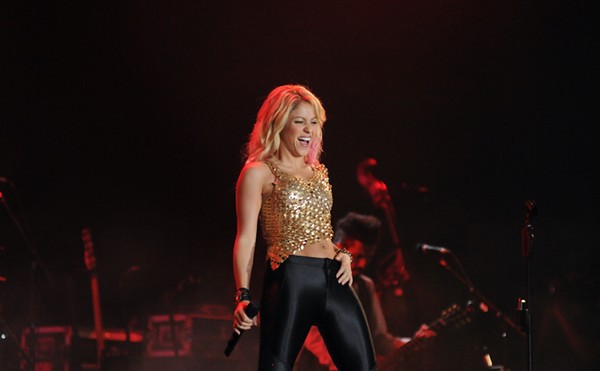Across six albums, including their riotous 1977 self-titled debut and their groundbreaking and ambitious 1979 double-album, London Calling, the Clash helped change the face of popular music. They gave punk rock a conscience, and in turn, helped transform it from a bizarre, fringe movement into global musical phenomenon, influencing everyone from No Doubt and Rage Against the Machine to Sting and the Indigo Girls, along the way. Their 1984 album, Combat Rock, produced their biggest hit, "Rock the Casbah," but their commercial success was followed by a bitter break-up. Jones and Headon were dismissed from the band and Strummer soldiered on for one more unremarkable album, before shuttering the Clash for good in 1986.
After the band's dissolution and the subsequent lukewarm reception for a pair of solo efforts in the late-'80s, Strummer all but disappeared for most of the '90s, popping up occasionally to pen the odd song for a friend, play a one-off gig for charity, or to work with influential Irish folk-punk oddballs, the Pogues. Then, in late 1999, he re-emerged with a new backing band, the Mescaleros and a new album, Rock Art & the X-Ray Style. But rather than grasp sadly at his formerly punk glories, Strummer stretched out with his new band, displaying a serious interest in offbeat pop, folk, reggae, and world music that his previous work had only hinted at. A second solo album, Global A Go-Go, followed in 2001, pushing Strummer further in these eclectic directions.
Last month, the Clash was selected for induction into the Rock 'n' Roll Hall of Fame and there was much speculation that the group would reform briefly to play at the induction ceremony on March 10 of 2003. In point of fact, at a November 15 show with the Mescaleros in London, Mick Jones joined Strummer on stage for the first time in nearly two decades, blazing through a handful of Clash tunes.
In the days leading up to his death, Strummer had been at work on a new album with the Mescaleros and had also co-written a song called "48864" with U2 frontman Bono and former Eurythmic Dave Stewart, which honored Nelson Mandela.
In this interview, conducted late in 2001, Strummer was kind and good-humored, looking back without anger at his the long shadow that his days with the Clash had cast, not just on the rest of his career, but on his whole life.
David Peisner: It's been about 15 years since the Clash split up. Can you look back now and pinpoint where it started to fall apart?
Joe Strummer: Well, Combat Rock were very difficult sessions. There was a bit of friction. When friction builds up people stop communicating - or maybe that's the cause of friction - but whatever it is, the result is people don't tell each other what they think anymore. Then you're really in bad water. And we couldn't get out of it. I think that kind of finished us off.
DP: Ironically, Combat Rock was your most successful album in America. Was that kind of coming at an odd time in that, as you said, the band itself was starting to splinter?
JS: Yeah. Sometimes, when I look back, I think that when you're struggling to get somewhere, it holds you together. But when we kind of got a Top 5 hit with "Rock the Casbah," it kind of blew us apart because we figured we must have reached the top of the mountain. And then the struggle wasn't keeping us together anymore. The unity of the struggle. Plus, we'd done too much in too short a time. And you look back and think, "Aw, hell it wouldn't have hurt to take a few years off." I'm sure we could have afforded it. But when you're hot, you're hot. It was all sort of go, go, go. I often think that would have saved Kurt Cobain as well.
DP: Did it simply not occur to anyone at the time to take time off? Was there just too much going on?
JS: Yeah. You just couldn't think properly. You couldn't step back long enough to even think that simple thought. Everything was always in your face so you could never get any perspective on what you were doing. You were kind of being driven. I don't know who was driving, but it was too much.
DP: But you still made one more album, Cut the Crap, before calling it quits. Why?
JS: Well, Bernard Rhodes and Kosmo Vinyl, who were the management team, they started directing things behind the scenes. It was at their instigation that we fire `drummer` Topper `Headon` just because he'd become a junkie. Which, in hindsight, you think, "So fucking what?" We could have hung with the dude. But I guess, at the time, no one knew anything about heroin. And then me being burned out, I allowed Bernie and Kosmo to tilt my hand and fire `guitarist/vocalist` Mick Jones, because it wasn't any fun anymore to be around him. So we fired him and Bernard and Kosmo hired these other guys. So, really, I became a plaything in their hands. And I blame myself. I should have realized what was going on. I was burned-out though. I was absolutely exhausted. That's my only excuse.
DP: So do you think that album ended up being a reflection of all that?
JS: Yeah, and also Bernard Rhodes wanted to really take over, big-time. He wanted to be the producer even. And I let that happen. Everything was wrong. There was no vibe, it was all Bernard's ego. Everything was wrong.
DP: In retrospect, do you wish you'd just called it quits after Combat Rock?
JS: Yeah, definitely. But then again, you can't have it the way you want it really. You've got to accept the way it was. And that's what happened. But yeah, that would have been a sweeter way to end.
DP: After the Clash, you did a soundtrack and a solo album, then pretty much retired from making music for about 10 years. What pushed you out of music?
JS: I think this is when I decided to quit: just after Earthquake Weather came out, we were playing away across the States and really sweating it out every night. You know how exhausting it is on tour anyway, and we were really kind of giving it everything. Then, when we hit New York City, a guy came into the dressing room after the show - we were sitting there, gasping for breath - and he said, "Hey Joe, I'm sorry but I've got to tell you that I went to Tower Records in Greenwich Village to buy the record and they didn't have a copy."
DP: It must have felt like a far cry from the days of London Calling, when it was such an event when you guys put out albums and came to town.
JS: Yeah, absolutely. `Laughs` It was the complete opposite. But you've got to look at clouds from both sides now, as Judy Collins said. But I just realized that if I couldn't even get my record into Tower Records in Greenwich Village the very night that the tour hit New York - never mind Poughkeepsie or Oswego - I thought, "Well, you better retire yourself boy!" That's what I said to myself. And also, my parents died and my wife gave birth to children. Suddenly everything had shifted from being a care-free rock 'n' roller. Suddenly you're holding a lot of things on your shoulders and you've got to ride with it.
DP: So what did it feel like to come back after taking a decade off?
JS: It was kind of like being new. It just felt - no spotlight on you, nobody wanted to know you - you're kind of free to operate. In the shade at the edge of the picture you can maneuver very well.
DP: Did you have any expectations of your return, as far as re-establishing yourself as a mainstream artist?
JS: Well, not really. Because I kept that experience of Earthquake Weather as a template of how hard it is in the world when you've not got your hit group with you or the crest of the youth wave you were riding has crashed on the shore. It's sink or swim time, so I knew that it was going to be tough. I just wanted to get to the point where the label, Hellcat, was willing to make another record. That we wouldn't be thrown on the tit straightaway. We'd get another crack at it. Which we did.
DP: There's such a wide range of musical ideas and styles on your last two albums. Were you worried that it was going to be tough to synthesize all those different ideas into something coherent?
JS: No. Because, we're too stupid to realize we have to be coherent. That's our saving grace really, because, you do what you feel and you hope it works. I couldn't talk it up more than that. I don't think it's really good approaching something with a grand design, 'cause then you can't let things happen. You've got to let things happen somehow, to get things really natural and grooving.
DP: How does recording with your band now, the Mescaleros, compare to the way you used to work with the Clash?
JS: It's very similar to Clash sessions, because the Mescaleros like to work with the vibe, like the Clash did. People chill out, relax, get in the mood. We keep it free and easy and just enjoy the music. And both the Clash and the Mescaleros were really long-distance session rats, as I call it. A session might go 18 hours and you kind of get somewhere in that time. There's time for people to try things; to give up, to start again, to experiment. It's kind of like being in a spaceship sometimes. Especially during the night. I love working during the night when no telephones ring, because everybody else is asleep. So that's the feeling you get, like you've cut the moorings and drifted off from the world. You can really intensely concentrate.
DP: Are you happy with the way Global A Go-Go came out?
JS: Yeah. I'm really happy. Y'know, once I met Paul Simon, accidentally, in England. He was staying at some guy's house that I dropped in on. And we got to talking and I was talking to him about `Simon's album` Graceland, and he looked at me and said, "One day you're going to put it all together, everything you've ever done and you're going to make a record and it's going to come out great. Just concentrate on that. Try and make that record." That was about seven years ago he said that. I've kept that in my mind and when I was listening back to what we'd done this time, I thought, "We've finally made that record in my mind that I hadn't spoken to anybody about." I'm gonna send him a copy.

















